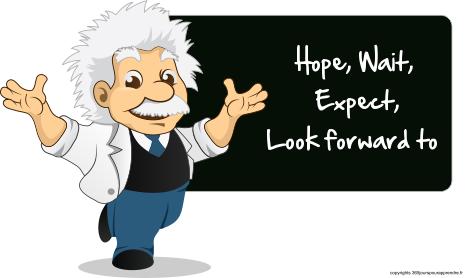Difference between Expect and Wait
What is the difference is between expect and wait? It is possible to ‘expect’ and ‘wait’ for something or someone, so these words can be used as synonyms of each other. The difference in these words lies in the usage and exact meaning of them.
‘Expect’ is a verb. It can be an intransitive or a transitive verb. It means to look forward to something or to await an event. For example: We are expecting a visitor soon. It can also mean to think with certainty someone will come or something will happen. For example: I expect to get a raise this year. Finally, ‘expect’ can mean to simply consider something to be reasonable, required or necessary. For example: The handbook tells us what is expected of all new employees. When the word ‘expect’ is used it indicates a high degree of probability or likeliness that something will in fact happen or arrive. It implies preparation of some sort has been done for what is expected.
‘Wait’ is also a verb and can be used as an intransitive or transitive verb. It takes on more of the meaning of being patient, or staying in a certain place until something happens or someone comes. For example: We will wait here until our visitor comes. It can also mean to not do anything until something else happens. For example: We will wait until spring to decide where to go on vacation. ‘Wait’ can have the meaning of remaining in a state of expectation or hope that something will happen. For example: We will wait and see if the delivery comes. ‘Hope’, however, conveys less of a certainty than ‘expect’. ‘Wait’ can be used for an event that is likely or certain to happen, or only has a possibly of happening.
There are several common verb phrases that use ‘wait’ in English. This broadens the usage of it. To ‘wait on’ or ‘wait upon’ means to provide service to as in the case of a waiter at a restaurant, or it can be used to show waiting for something that is delaying, although this is a more colloquial usage. For example: I was waiting on him to give me an answer for 2 hours. To ‘wait up’ means to stay up or delay going to bed in order to wait for someone to come. For example: I waited up until midnight for the visitors to arrive. To ‘wait for’ is used when something is likely to happen and patience is needed before it happens. For example: We had to wait for him to get dressed before we could leave.
Although ‘expect’ and ‘wait’ can be considered synonyms. Using the word ‘expect’, it shows more of definite or probable event will occur. ‘Wait’ indicates a period of time must pass before something will happen and one must stay in a certain place or not do anything. ‘Wait’ can imply keeping in expectation of something, but it has a much broader meaning and usage.
- Difference Between Hold on And Hang on - February 19, 2016
- Difference Between “Give it up” and “Applaud” - February 18, 2016
- Difference Between Condole And Console - February 17, 2016
Read More ESL Articles
Search DifferenceBetween.net :
Leave a Response
References :
[0]http://tx.english-ch.com/teacher/jun/others/hope-wait-expect-and-look-forward-to/

